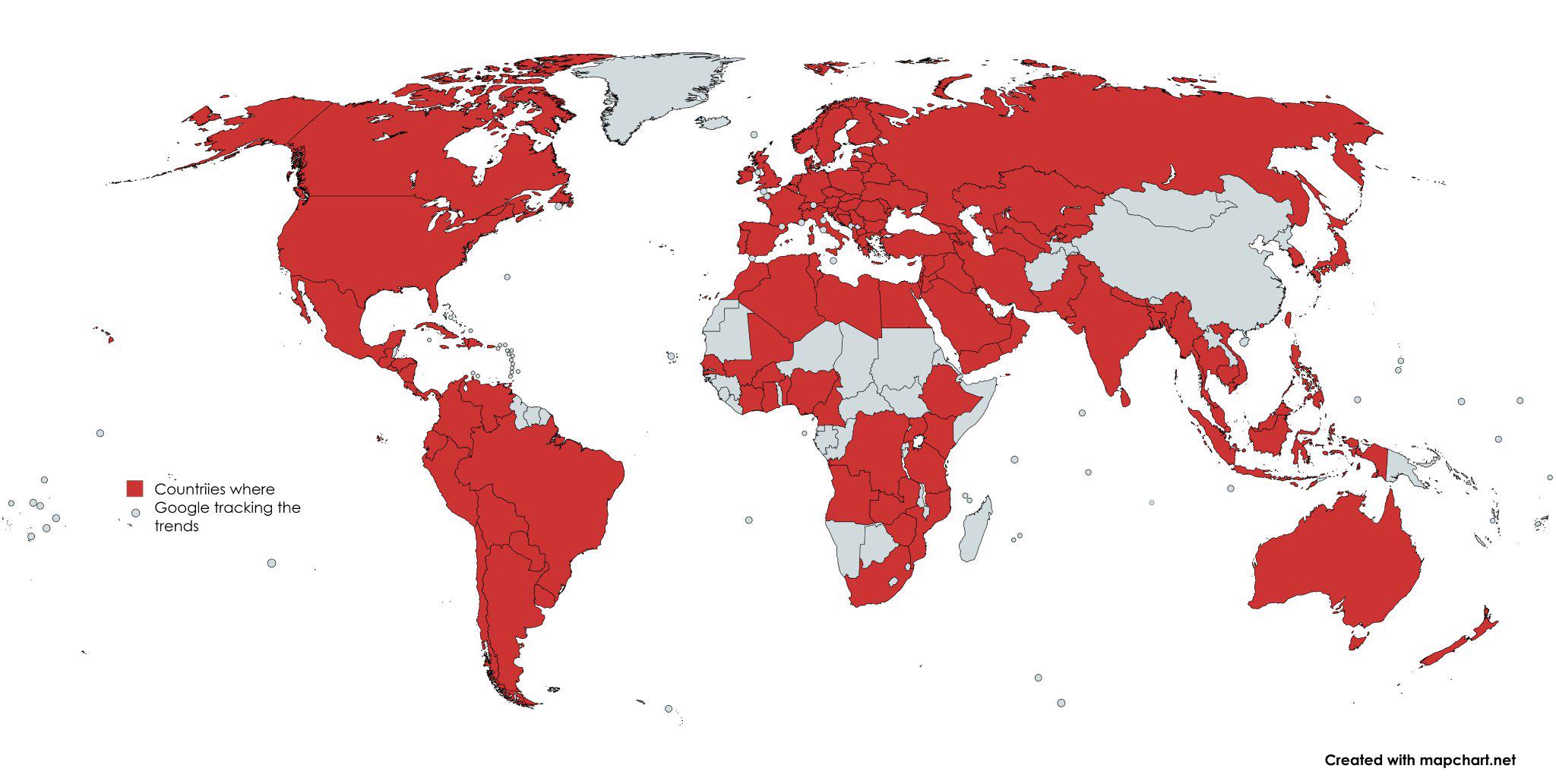Google Trends Tracking by Country Map


David Chen
Data Visualization Specialist
David Chen is an expert in transforming complex geographic datasets into compelling visual narratives. He combines his background in computer science ...
Geographic Analysis
What This Map Shows\nThis map illustrates the countries where Google is actively tracking and reporting trends in search behavior. It reveals how different regions engage with various topics over time, reflecting the interests and concerns of their populations. From health to entertainment, politics to technology, Google Trends provides a window into what people are curious about across the globe. This data is not only fascinating for marketers and researchers but also offers insights into cultural phenomena and societal shifts.
Deep Dive into Global Trends\nEver wondered what the world is searching for? Google Trends offers a fascinating glimpse into the collective curiosity of populations around the globe. By analyzing search queries, we can identify patterns and spikes in interest related to specific topics. For instance, during the COVID-19 pandemic, searches for health-related queries surged dramatically, showcasing the urgent need for information about the virus, vaccines, and safety measures.
Interestingly, Google Trends also highlights seasonal interests. In countries with distinct seasons, searches for winter sports peak around the onset of snow, while summer months bring a rise in queries about travel and outdoor activities. This dynamic nature of search patterns is influenced by cultural events, holidays, and even local festivals, showcasing how unique each country's search behavior can be.
In addition to seasonal trends, we can observe significant geographical differences in search behavior. For example, topics related to agriculture might dominate searches in rural areas, while urban centers may show a preference for technology and lifestyle trends. This suggests that not only are people searching for information relevant to their immediate lives, but they are also influenced by their environments and communities.
Moreover, the availability of internet access significantly shapes these trends. Countries with high internet penetration, such as those in North America and Europe, display a broader range of search interests. In contrast, developing nations might show concentrated interest in fewer topics, often related to immediate needs such as health care or education.
Regional Analysis\nBreaking down the map regionally reveals intriguing patterns and contrasts. For instance, in North America, there is a strong interest in technology and social media trends. Searches related to major tech events, product launches, and digital privacy often dominate the landscape. In comparison, countries in Asia, particularly in Southeast Asia, frequently exhibit spikes in searches related to entertainment and mobile gaming, reflecting the region's vibrant digital culture.
In Europe, the map shows a blend of interests, with countries like Germany focusing on economic topics while Southern European countries lean towards travel and leisure searches. This divergence may be attributed to local economies, cultural attitudes, and even historical factors that shape public interest.
Interestingly, in Latin America, we often see spikes in political search trends during election seasons. Countries like Brazil and Argentina show intense engagement with topics related to governance and civic issues, highlighting the importance of political discourse in these regions.
Africa presents a unique case. While internet access is still growing, the trends often center around basic needs, such as agriculture, health, and education. However, in urban centers like Nairobi or Lagos, there’s a noticeable shift towards technological and entrepreneurial searches, reflecting the continent's burgeoning tech scene.
Significance and Impact\nUnderstanding trends tracked by Google is crucial for various stakeholders, from businesses to governments and NGOs. For businesses, these insights can guide marketing strategies and product development, ensuring they align with consumer interests. For governments and policy makers, trends can inform public policy, resource allocation, and community engagement strategies.
Moreover, the implications of these trends extend beyond commercial interests. They reflect societal values and priorities, showing us what communities care about most. As we move into an increasingly digital future, these data points will become even more critical in understanding global dynamics.
Looking ahead, the continued evolution of technology and social media will undoubtedly influence search behaviors. With the rise of AI and machine learning, we might see even more granular insights into what drives human curiosity across the globe. The question remains: how will these trends continue to evolve, and what will they reveal about our shared human experience in the digital age?
Visualization Details
- Published
- September 1, 2025
- Views
- 91
Comments
Loading comments...